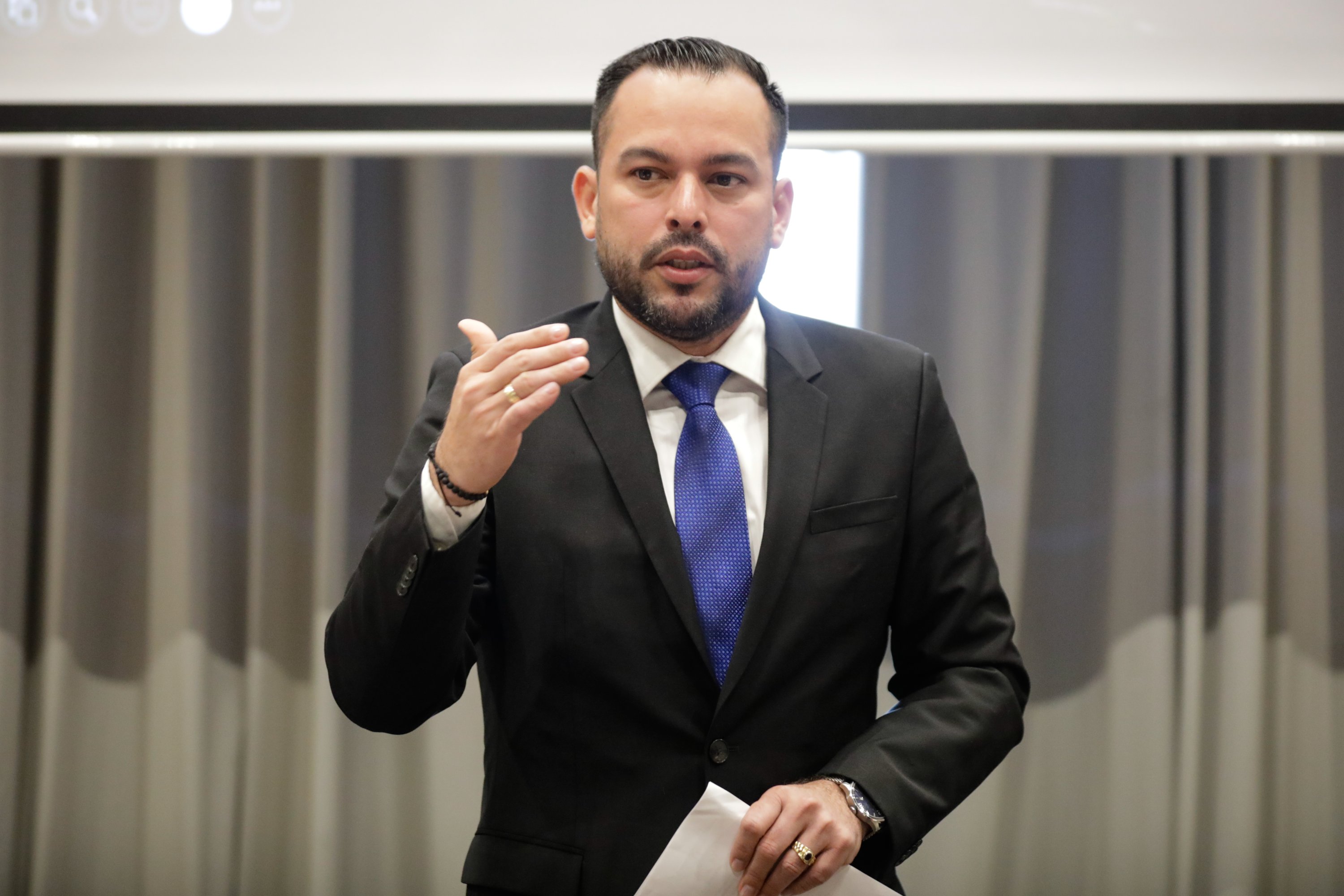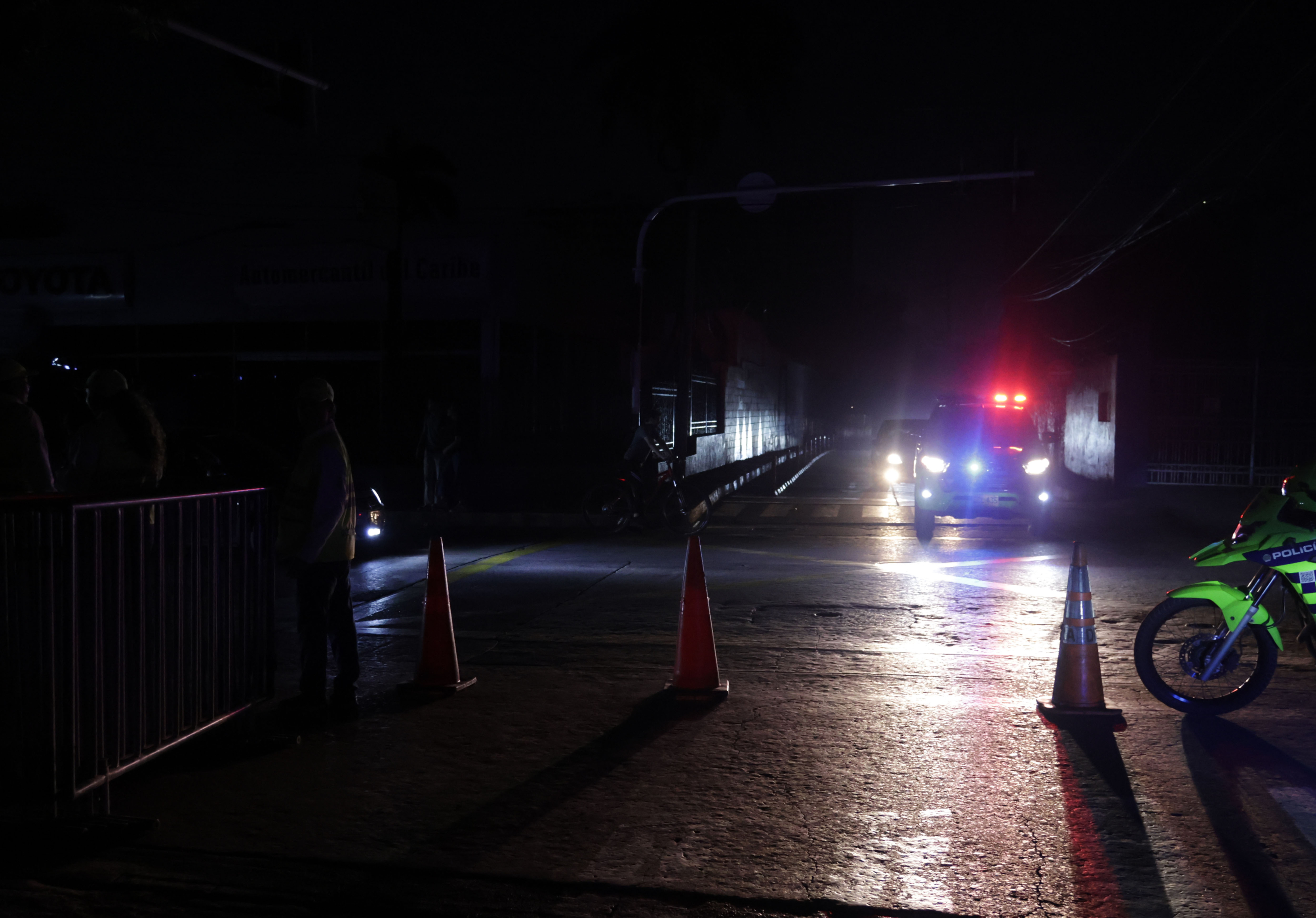'If the Caribbean enters an energy crisis, the national landscape will also enter': Minister of Mines and Energy

For nearly four months, Edwin Palma Egea has been the head of the Ministry of Mines and Energy. A lawyer by profession, he is recognized as a leader in the labor movement, a role he excelled in as an Ecopetrol employee, eventually becoming president of the Workers' Union from 2018 to 2021.
Appointed Deputy Minister of Labor Relations and Inspection at the Ministry of Labor in 2022, he held that position for a couple of years. He has also been a member of Ecopetrol's board of directors for 15 months, and his name is frequently mentioned as a candidate to take over the company's leadership, should Ricardo Roa resign.

Edwin Palma, Minister of Mines and Energy. Photo: Sergio Acero. EL TIEMPO
At the end of October last year, Palma was appointed Air-e's supervisory agent, a position he held for four months. The official spoke with EL TIEMPO about the present and future of the company, which provides electricity service to three departments on the Atlantic coast and faces a series of challenges.
How would you describe the current situation of Air-e? I would define it as delicate, something that led us to intervene in the company at the end of last year. It's important for people to know that the intervention isn't a game, but rather a government decision based on grounds outlined in the law. Furthermore, in this case, the company itself requested intervention due to the situation it was experiencing, the price of energy, and its own difficulties.
What would you like to know today about the circumstances at that time? I think it would be worthwhile to conduct a thorough investigation into what happened before September 12, 2024, when the intervention resolution was issued. It would be worthwhile for the country, and especially the Caribbean coast, to know what happened in the three years that Air-e was in private hands, with large amounts of public funds. It would be worthwhile to understand why the business was abandoned after three years. There's still a truth missing.
And now? A business solution is required, and the government is working on it under the leadership of the Superintendency of Servicios. We hope to hear soon so we can make another attempt to provide electricity service in the three departments where Air-e operates (Atlántico, Magdalena, and La Guajira), which must be sustainable and of high quality. This is beyond my jurisdiction, and the Superintendency will decide what will happen. Obviously, we work together on regulatory issues or matters that fall under the jurisdiction of the Ministry.
What would you like to see next? Much of the solution, as the President has specifically pointed out, has to do with the possibility of self-generation, something that extends to individuals, neighborhoods, communities, and public entities. In concrete terms, this would reduce the market for electricity distribution in this region of the Caribbean. The same must happen in the rest of the country, because it is the way to reduce rates and guarantee the permanent and efficient provision of the service. That is the additional ingredient.
Why is it required? Seven companies have passed through the Caribbean over the course of 20 years, and none have provided a good solution to this need. Many are demanding from the current government, with greater firmness, greater criticism, and greater malice, what has not been demanded of the political class still in power today when they could have done something from the national, regional, and local governments. We wanted to include the additional component, which is the entire issue of Colombia Solar, energy communities, and self-generation. This would put an end to what is a great paradox.
Which? The Caribbean has great potential for energy generation. And that requires a broad regional agreement that includes the political class, users, the private sector, and the government. Because there is a misconception, mistaken in my opinion, that this is a problem for coastal residents and not for the entire country. Many don't understand that if we enter an energy crisis in the Caribbean, the national energy landscape also enters a crisis. I think the region's political class has failed to elevate this debate to a national level.

Facade of Air-e's headquarters on 77b Street and 59b Avenue in northern Barranquilla. Photo: Vanexa Romero/El Tiempo
We're going to open the discussion in the next legislative session by presenting a bill. We'll see what the reaction will be from the Caribbean bloc, which complains and complains every day, but doesn't contribute or propose anything. When the debate on the tariff option we included in the Financing Law took place, the response was that it was a trap because a bill with only one article on the matter should have been presented. Well, months went by, and nothing was presented by them. There's something of a double standard, a cynicism there. They're interested in worsening the energy crisis in that part of the country, when they've had a hand in what's happening in their own land.
People complain about the blackouts… No one is exempt. Let's look at what happened in Spain. There's a technical system with its complexities, and nothing is perfect. Obviously, in the Caribbean region, there's a lack of investment in infrastructure, substations, and power lines. That's why I insist that the media help conduct an investigation into what happened before. What I found when I was Air-e's auditor is that it didn't make the investments it had promised, and that impacts the reliability of the service. That's without overlooking two debates that should be national and have to do with the cost of energy in generation and the high level of electricity losses.
And what happened with the four-hour power outage in Barranquilla last week? The preliminary information we have is that what happened was not due to an Air-e fault, but rather to an operator's fault. The matter is still under investigation. Meanwhile, some of the statements made seem very frivolous, as they lend themselves to all sorts of conjecture. Furthermore, in Santa Marta, there was a scheduled power outage to replace a transformer that improves service reliability in the city.

Blackout in Barranquilla. Photo: Blackout in Barranquilla.
When I was head of Air-e, we estimated that 1.6 billion pesos were lost daily to energy thefts. And many of these thefts didn't involve poor people or those from poor neighborhoods, but rather those with the most wealth. This adds to the country's poor stratification, because we were able to see that mansions, businesses, and large buildings were in stratum one and ended up being subsidized by the National General Budget.
There is talk of his differences with the Superintendent of Public Services… Rumors always arise, suspicions arise, and divisions arise within the government. I was appointed to Air-e by the Superintendent and worked with him for four months. I believe I fulfilled my obligations as an auditing agent. Now that I'm in the Ministry of Mines and Energy, I understand that we have to work together, and we are doing so. This isn't about becoming best friends, but rather about having the ability to coordinate efforts and solve the problems facing the country. In the end, he and I are part of the same government. We have to answer to our leader and boss, the President.
What should happen next semester? Build the business solution. The Superintendent has announced that he has it, and that's why I've asked him to work together. I'm very interested in being able to respond to these three departments, along with their million users. I've proposed a meeting to discuss the issue in the coming days. We need to show the country and what they call the electricity market signs that we know where we're going.
That is to say? Because there are debts from after the inauguration and previous debts. The previous ones correspond to the private company that was there. The President has said that we will not assume those obligations, whether Air-e goes into liquidation or not. But the subsequent ones, which correspond to the intervened company and amount to approximately 1.3 trillion pesos, could affect the provision of service because they would trigger a domino effect on generators, especially thermal plants. That's why it's key to demonstrate that we have a roadmap, something that involves the Ministry, the Superintendency, and also the Ministry of Finance and National Planning. It's about finding a long-term solution. For the President, for the Government, this is very important, and we have an obligation to address this need.
A draft of a Conpes document is circulating, according to which a public company would be created to provide the service where Air-e currently operates. This company would have public capital of 1.5 billion pesos and a national guarantee of a similar amount. How do you rate the proposal? I don't know the proposal yet.
What is your response to the claim that the government is creating an "induced crisis" in the electricity sector (due to unpaid subsidies and the collection of tariff options in limbo) to intervene in companies with solvency or liquidity problems? Whether or not a company is intervened depends on the Superservicios (Superintendency of Services), but it has never been government policy to stop paying subsidies to create a crisis. Proof of this is that we recently paid 2.5 trillion pesos. A crisis created by the political class, leaving the nation in debt.
Available information shows that Colombia is headed toward rationing in the near future if it doesn't expand its generation capacity. Do you agree with these alarms, and what is being done to prevent this scenario? For this purpose, two auctions have been held: one for reconfiguration and one for expansion. Another for expansion is underway, as is another for renewables. Regarding demand, we must wait for the scenario presented by the Ministry's Mining-Energy Planning Unit (UPME). But I find it curious that the last person to speak about this was Tomás González, whose resignation Santos accepted for not taking action on the matter.
More news from EL TIEMPOeltiempo





